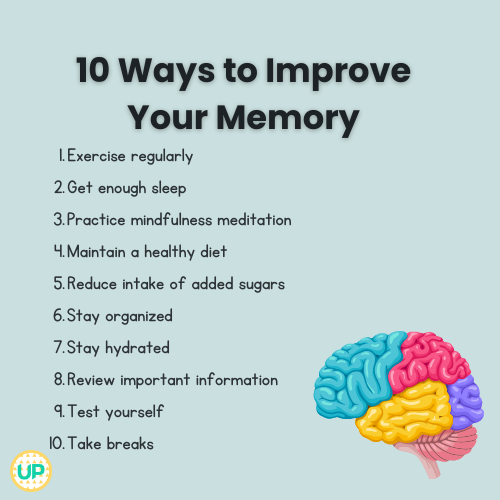10 Ways to Improve Memory
Have you ever had trouble remembering things? Whether it’s studying for a test, remembering a speech, or just remembering someone's name, having a good memory is extremely beneficial in our daily lives. Here are 10 ways to improve your memory so you don’t forget anything again!
1. Exercise regularly
Exercising makes the blood in your brain flow better, helps form new brain cells, and lowers inflammation. All of this helps improve your memory. Including activities like jogging, swimming, and biking in your fitness routine helps maintain a sharp memory.
2. Get enough sleep
Getting lots of sleep at night is super crucial for being wide awake and focused during the day. Sleep deprivation, or not getting enough sleep, can negatively affect your ability to remember things and concentrate. Sleeping enough is really important for keeping our brains working well. High school students should aim to get at least 8 hours of sleep every night. When you have enough rest, your memory is stronger.
3. Practice mindfulness meditation
Stress and worry can make it difficult to remember important information by causing your brain to forget things. To calm yourself down, you can practice mindfulness meditation, which helps relax your mind and body. You can find free apps or search for guided meditation on YouTube! Focusing on the present and ignoring distractions helps our brain understand and remember things more effectively.
4. Maintain a healthy diet
Eating healthy regularly ensures that the brain gets all its needed nutrients. Eating healthy foods with fruits, veggies, whole grains, protein, and nutrients can reduce or prevent inflammation, which causes memory loss.
5. Reduce the intake of added sugars
Sweet snacks and drinks like soda often have extra sugars that you can find on the nutrition facts label. Eating too much food with added sugar can cause problems such as trouble with thinking, remembering information, short-term memory loss, and more.
Studies show that those who consume a large amount of added sugar generally experience weaker memory and cognitive function. People who control how much sugar they consume have improved memory and thinking abilities.
6. Stay organized
Being organized helps to improve focus and prevent distractions. A tidy workspace can improve our ability to concentrate on tasks as we won’t have clutter or other things lying around that can distract us. Staying organized can also help us manage our time more efficiently and prevent us from forgetting important tasks or deadlines.
7. Stay hydrated
It’s essential to drink enough water to prevent dehydration. Not drinking enough water can make you tired, give you headaches, and make it difficult to concentrate and remember things. You should aim to drink 8 cups of water every day, although this can fluctuate depending on your age and weight.
Pay attention to your body to know if you are drinking enough water. Feeling thirsty, having a dry mouth or skin, and feeling tired or dizzy could signal that your body needs more water.
8. Review information regularly
Reviewing information regularly can improve memory by strengthening neural connections in the brain. When we learn new information, the brain forms new connections in the brain. However, these connections can weaken over time if the information is not reviewed.
Regularly reviewing information strengthens these neural connections, improving our ability to recall it later. Think of it as a personal study session to strengthen your brain function! Reviewing the material multiple times instead of cramming it all at once will help you remember it for a test as this will allow your brain to retain the information for a longer time.
9. Test yourself on the information
Testing yourself on the information is the best way to remember things for a test besides reviewing it regularly. You can do this by taking practice tests, creating flashcards, or summarizing the information in your own words.
By testing yourself on the information, you can identify the areas where more studying is needed. It also reinforces your understanding and works as a great short-term memory exercise.
Here are some exercises to improve short-term memory:
Memorizing a phone number and then recalling it later.
Recalling a list of items after briefly looking at it.
Playing an activity that requires focus and attention, such as puzzles or chess.
10. Take breaks
If we work on something for too long, our brains might start feeling tired and that could impact our ability to remember things. Resting our brains helps us feel energized and focused when we start working again.
Final Thoughts on Improving Memory
We hope you found these methods helpful. In fact, you may already be implementing some of these methods in your life, which is great! There are many ways to improve memory and academic performance, such as getting free tutoring sessions. Good luck!

